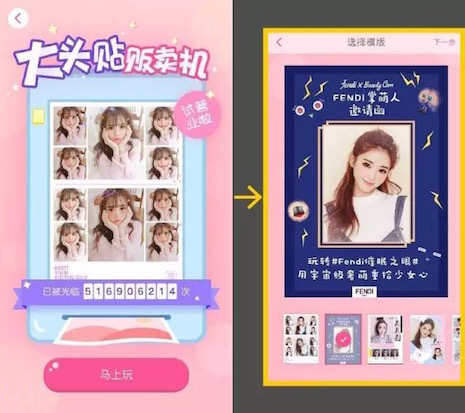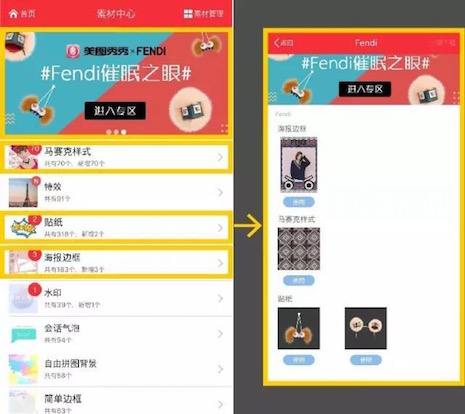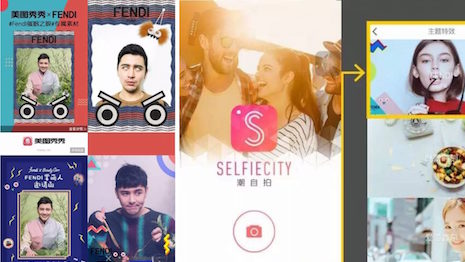By Jessica Rapp
In tech news in the past week, China’s social media app Weibo is showing signs of a strong rebound in a WeChat world, and luxury brands have been wasting no time taking advantage of the platform’s expanding reach.
Fendi recently rolled out a new campaign on Weibo asking followers of the Italian leather handbag brand to show off their best selfies. In a culture where the selfie is everything, the company enlisted the aid of not just one, but three different selfie applications to give users a variety of ways in which they could show off their smile with Fendi’s new “Hypnoteyes” capsule collection.
One of the apps is Meitu Pic, part of a company that also produces livestreaming app Meipai that has just been reviewed for a potential US$5.23 billion IPO. The company’s apps altogether have more than 400 million monthly active users, and Fendi is hoping to tap into this user base with its multi-pronged campaign. Meitu Pic users can access an exclusive set of Fendi frames, stickers and more to decorate their selfies and post them to Weibo with the hashtag, #FendiHypnoticEyes.
Fans can also participate by uploading their photo on BeautyPlus and Selfie City, both apps under the Meitu umbrella, but which serve slightly different purposes. BeautyPlus, for instance, boasts a filter that’s meant to improve skin blemishes, while Selfie City offers filters and frames from popular films. Fendi has customizable frames and filters on both apps for users to try.
 Gaga over Fendi
Gaga over Fendi
One of China’s most influential fashion bloggers, Gogoboi, serves as Fendi’s selfie role model to give participants a goal to reach. Gogoboi started out as a Weibo blogger, but now, he also has fashion content on WeChat, including his own store as the platform has grown into a critical tool for marketers and ecommerce.
There had been talk among China’s tech experts in recent years that Weibo was facing impending doom as WeChat grew to become a major player in the daily lives of everyday Chinese consumers, from being a payment mechanism to a platform to message friends. Weibo started out as a Twitter-like microblog in 2009 and grew to more than 300 million users before taking a tumble in 2014 after both the rise of WeChat and a series of censorship crackdowns (which, by 2015, prompted real-name registration on all Chinese social media sites). In 2014, only about 5 percent of Weibo’s users were generating almost all of their content.
 Vouching for its characters
Vouching for its characters
Now, though, things are starting to look up again for the platform. Weibo has appeared to have carved out a unique space for itself in the long-form blogging and video sphere by removing its character limit for posts and partnering with video sharing app Miaopai. In the past year ending in September, Sina Weibo has seen its monthly average users grow 79 percent, according to big data service provider QuestMobile. Its growth rate is faster than WeChat and even Alibaba’s ecommerce giant Taobao.
Even since WeChat’s rise in 2014, marketers still never quite gave up on Weibo when it came to luxury brands, but their approach to the platform is often different. For starters, Weibo, unlike WeChat, doesn’t have limitations on how often you can post per day, according to Kim Leitzes, founder of KOL marketplace ParkLu. Sometimes even the content is different—Revolve Head of Greater China Jessica Shen said they like to encourage their fans to post street-style photos of their favorite Revolve outfits to their Weibo accounts, and they curate the best ones for their page. Weibo, she said, gives them an opportunity to create an almost Pinterest-like page of images for their brand in a clean, minimalistic style that stands out among all the noise.
IF WEIBO continues to gain momentum, it’s highly likely more luxury brands will be turning to the platform to grow loyal followers, but in a way that complements their WeChat content. Fendi did this by adding a Whack-A-Mole-style “Catch Hypnoteyes” game to its WeChat content stream, where players could also browse the products, and download animated sticker versions of the bags to send to friends.
Jessica Rapp is associate editor of Jing Daily, the leading digital publication on luxury consumer trends in China. Reach her at [email protected]. Reproduced with permission.
{"ct":"C30+8xrOB79fQoxmPK\/N39I4hdOHLy8+gbVdwvMo+O0sRP6Biiw3w8RaH+gdQBDylmqAhaDHX8xmBJhYH961kBP1fTP94EgTdG0+NO8mX0u0HlpULFXsPVq82P1jDyoAiT5m\/AAAGJ5JoGyUROjzC2EkHuqfpe+GqbHg6pp9WJ8PLJB4WmMNrbeGjGGY8vX9o4\/gMPxuXScwj6lZeB\/kPWh2G6PCX2yR9Wy53xdhYnhuZsNYJdu20lI95+ZoE4nVzxpaOFl9e6rLYLD0klrmsLNKtzRh4nV+nnosPtQLbK9061rmkfIqq8oG0qtb5filpTlwXhy+GFQiSuXxtIrLt2Ud9JOTh4ufkWJY7efnbq0LKTxOQsx4glEA94bbS18WD7edxKW8vQT03nr7ZkybxtP\/Ev0i8FMr\/D18ltD9wxHC32rR5F0jM6\/oU+DcIjL5FXt3DzgJ\/jU6Fha3LaaaQ1XxwWq8Di1HhbNYjpihXgn9KTD2aZTtlDe9NWVlDhUEkisY92OKkjHZNaAiXAcnUq\/M17+0lnWxUvsIs61AEDV1IHRmhTyiq4qxBED4fd9KRJKLJDC8QPL5qr3kX+rRkIurmmokNWDSGD3EoawzAtWS0cxX\/A2LodO8DeHAum\/zQD6XArHwnVgiQHf+93CIn78EPvDsktRNddmsnVA2qkcDEILmPV9enKUgSI2h4oskEtsBJVz2tvOn\/Nsul+Iph2aQeDPzeaT+5k3NFVcBQE5QSli2hS3h9cZAcFGEnfcoSOnWZQDur44jsO2a2AnhgvYSO1rY7UcjV0Z2FyMplqGp2Z\/2WCWCho94c41eh8+pgnYQ30hu86x\/4RVWXPjqgWM7RgwYgF6KMeFX\/jWdZ\/po2MNIq4kcRHd4e+BScboYvVwwrZdW4rig6dOME6xWqIUdFmGZxSX9V4enSOZvu26DCNWGRlF\/ucVjTcFkI3jOQci+63A0d\/LD+AKnDp9moqEmMQF9csmFbaUsbsCFBHPT5hCpyl5Ri8n7ZtLPGzriOqSqh1SzmfU90RsowMcHtOE0RiNj3C1f65aam8wL0aM94vOaB1FUzc8VzTPwBxvnoYL6\/WSGj+Q44GUneE1bYWcqL0MQ7shu\/+yLd8zGqskt2ClpBnsU+c3nJ2SOOo6dgvmVulE+JhP6pVJKAG5yRiij4kVi4Th9p31BCvVyQyoF9hBqQpQMQs2zucTNmhvVtQHd8oQqPAxQOAbiVVE89Atn4PZRyicP8xzHUWRRGn1eal8RxNKRmntXC8NXHf2COXjSkfuLCvgq78pRw5\/rteb2t45RgZ+fzTKhAQ9F0eph1UD6xRfIhYjTeeEsjLrAPriGzat8DqJ+XndIc1C06\/rZx4KrawhDSgBFYmWy2K\/qIT22gpsn8+69HV7IyWA\/JH11JMqr\/9xUe\/PsJ6egoNF4Vm0ua+LtI2rswKC1CmomiLj9BwekUNxXHNKB5Esq6UiX07WiuisEjIWueOTggA+n4padM0j2lFj\/ibcy\/Qp+YAXAF10fJiw3TvF3dCJhc9sfOwGA3cKuBNGwx104W8H6AcACrOTJpKurRTOGoZ0vsPH7wuvcV1dAL5KJ+7C\/ctqXyOm+KGm0imSKWpYzrhPAhEsaPhAKvpjzWf+AneTGdKi3SlytEtLJBKabtBJiDIF9yfSQlGDN5AmXfI6Vf+OMeHx4kvrgbYBpc9Bm2aiUstRpj89w\/MqJ2vYorUH1ufcezS4emA58xNPLuOUYpCUmz2QpWhvwVlBB9Ufa9ioQSjoJbt1FIn8LFuV0z557Y\/U6S4X28Ixnk2H9PDXZVsFqBzd62y7jgmvyGzJfUC9EXnf9ioOhXMpfa7ZeIUbvNxNT1xf47mSP2E8wCy\/FOuPEn7r4XRJcoYe+P7BWR+pgq8QnujsKX2t026zWMsf9Edw\/6zpAJMBVGh2Bt5GQlr7kE9KJ5F+RuA7eH9oEMH\/ldQvNpdI3tA7e211JT\/donxUaN0fePQYPZss2OM4bPm7YUGbltO3AC3DikGS4Y+pTYjwL5ojBVn3MWDmj9f9C6u\/8MbJ8mlmvbotLnN9GBqs6swDjFijdIUq9HYcktOdRFL6\/ltygau9h0Aj6puwELrBiDCb1QZwOWbd3xJqZ8W2C1N+BIt7DB0M\/8iAt2w8VEAw8QWRsHZ81+9glROSELdfdRxUmCaWYQ5h0aQtBSE4hdeLJS70gueZXFgsOxsgWxpaNLpJWA0Ao24sCr2lGfG0oyz8MNBNLJRAabjT\/Znmzd1XNXF2FDDY2lZU38YltSv70Lvpvl3uvwtiTfFC1PF+OSW4163CMVnCppDvsaojFmVR2oyKh7bJIhX7fvM4yYpfmshRW5ikcFHmcaNypkFMeCjqWgvq2zb4Ww4K6zyLAvSVOeUSFsje\/2UinituKRfH5ZvzpRmqfsfTMFpWmoRw7DkYIelRcJKM+bXYBrJGqafJkhhHIEFkTTweCqSt7z+hgjSSBiQ8vVNKcGV9731WlGVGEjTfAGJTyNsfeCsE9Fhc\/6rb4vZfjpR905Uv8LsKMEsKKNjhfWf69qmxPjC0P3lWBk3Iej7yp2z3dKbf5H5biGnHGF8efjPVjlylUQISncwlRjy4ll\/y3wfUfkaJHOmrlPx47Zzu38ENMY3G0yKvUjqiFtsD6ne29zNymNPEBl+hduO4W8ZYYcBnaYhlxVISFgEZWNpKFNtxXo5tAbYMReCDgh+yH\/1e9kCYb0uiuDWd858DOv4S5CtLhL8yEKGegYTcq7+g0ZcXuTviRlarZOaG0HEmKnGjchFBBFHo\/GP+ELlHiwP+FDM2V01VeE6AWlx7FnTsS9Q\/VSZq6s0MyOwylviQIX7EwCHeyZIRrlTbI7fC9hv2MiAkgubO4lQWTVX0Qax\/Mc5PRzPu2NAEqvzDDVbxxL6BDfWfkqD1IWaAykihK5XVrQQOYavkr5WCsgYs2vmsaVyVoLCSu5iu7BQGZRd+ZmMumAzaDgbFST1jDxKuUBvZ3BUS97EMJfSCmJCXJuKfskFazlsI0h5kt2KTkuiXEsVYCLKZml1o2T87zV51qGb3TshVlIaEehKN3CoPwBijA37wUeNRO4nk9yO28L+eo4DR3E6xe3KwZUyLXj+\/u4Bxb1LEvsFoG41+f4KuflpSdtirOPe80HaXgHplh5PzVaZgotj5+Ky8ScySezX\/d6C2ezhFwYCz5yDDSbPtAPcgnlm9sHDhhggCnCFyhD26kS\/gqdLh7Cfxhs1Bi0BlJEWSDYaito7yMRlBKo\/i1KZUH+EgvhjNe2XHnOXfUWyp7nyxHnwTLfdztZKg4qR3d6tfz\/qthIoG3+z3NrtBAmD6+yeXpfE7y+Gp9OHHrO8IdYg5IXNNY1+YA+oVtw8+k\/7P5jQofyilGCgOo5OeKdO\/4Wc2dQn55duRtUZO8An7mC0obt2djIlgcllFdB0xbSIF09Htq4rHVI+z5QMfWqMGeiGBMtBihqcjr5kTsye99jSW3f8RTghbUFuk+M5pY9o43KQVuoXcsHLSllK6BoJXS\/sdn90ecuMJEQADQ6slRG7ZqbARvtMvOUESv1Vh3JnZgL1WllzK3vQwaMLcg8ZCXK5OjXpRkSHU+IHQ2Cdj+17JyWlro26aJ6RdCZSSpTcMOdfWaHrxQiJW5zGw5+jOfErBo3Z7YVQivUbWArWggtXfplg\/IYnaik+H\/AC0EXScyix1J\/y2J5MMJXJu90Z7JNcZ7QrY+tuJ9Qqe8zahyYsMWmPh6BhfUR2QG017fawD410D+6uWKJjHr94aYphPh9ym+quBVqR\/ZfJJ5642nlAHw6s64HjuSkocWF1m7FplSse8vNWYBLC8a0bxfYW7ytlMPuTm3WN65vjNEqd6hdNgo4bfz8xafai6vQtd\/CitZmeGqU03ubgDpzZeQVbYrGU7cvYsdKZkS+mNenuBSYPxTpA3cjfsGkVA6oDbpot9cUyyOhMOhilyeDV2yn2hLitWsJ6yCSeVHZqQa69F4KfADnCz2Nd7WoGHeDA4fMZ0B\/uTExs63\/SWXdWwQC0N+6GQTPhIrveX0ZKT43tbw2UKdCpwLBdmaKch1Y0\/Z78yAXKn9zunXguFsoWWi1ohnUcuyl7Ab2tF9tduwE+D6efLIJ1RQJzl9vRxAnRTSzdT6vwtc4MDauQVKFmtAq2ssJkdV95+8+6Dl35y0xFKqzFXDoD2Et2vwzO0XBllSyfOj97caT9XEw9dx+6kksTYTvCz5+jbgT2we\/BpNb7gSMk88bFku3\/McS9SxNHUjNDuJBEKoSazrBzu8LfJZNhjyME7EZBVIBU09d+FPRSAtVQew2XN0maPpCYOIuCwOXLDm2hXJviGzqYJpZTv2i0OPUWzPpVFCv7JWubGd0Mlne3bQac8al6ocWSovZ\/bjPfVJpkVVp58GFHbH\/anA\/MIw4TU0Kp0apoYLOnFRN4q31Gap8sxbqCl4qC+jxw3o1yawXGePNZn1h4JsFBSoTzqRpWR7rd8Ok4odBwMsBRA6hHlSOTgftvGoulQP3HX114E1YuHnr1miMbo+4mqZEZUDAkP+S0C21KLjhtWESNNPKlbgSEXjISqhklZXmCHAA0oW7kOwJyKsPPL83TUe\/7tDyCb4vdlXKgHqytwXPhJjm7KTu7lk6sYxm6vVl8qPRySkabwDoZ+W1uJs6ZVCkdNYxH76UlCVJWjR+DjR3w2ttyJokhAHGARtE0tlWMv39tYDThrbg4tK+Yic+6f5josligGnziCQGZeQiO0S+v1G1OB4shgNSyzYizexHzWYInfOnmrJAyloC0HAd9Mf4RY1xVf3ShDOj5MJi+JQT3+MvphKXbkZn\/xFA\/HWiPAK71OewF2+ZujtC7pnuX6YptXk\/3UnlmynCkj8xFo\/g7btA79Tysw9i8h\/D6aCLpPwjM\/VqQHyk+YPSgxH0w8wNtRs\/m2ootqBmJ5xTkU6yuinWq0I+FnghOwQBD\/FsJpXVoY3LwqVM7HgkU20IXc6zyw4HhFg+6W4gUeGVYj8ENlHHVD\/xaoLyFU\/VpFdwCYj3NtCMkBmccGktgYNLg3wDSFP3uIl8uRIcc\/4G8LLnxDdEhiC9ZSmch7TGXhwi1nyQ\/k3TVxfk7uQPNvpJupmzfTWWMB3D1FC89CHN4bg4rZ7h2HJswrT2d\/3Fu5IOP6EOHZmpUhqbRfXHc0ZbOkYdehSyB2u7\/F\/jHSjueH6uDFKlDUid1rN7GaWkZhCyRHaQ5NyQhW7V1rTVgsyYLyxiq+d0be7fUiChY6wAzOLyIv8sJbUTxieMREuN9SG8CFc0YnQxVotRLXLQ91CjH6hx2q4AWNx58uRaacmJ7mtMN2RGUzbn3piY9V5TZYr93crp0j8ocS\/TaIGMwOyWCkK4LzSDayhWHiQp55Bhvkr\/CeVBrwgpSJ7Ce8yLNflQ2CK72ejjvJ9G2yKc9I6jRQJLyVTJKFod5sUybk9UNXpE2ACMXN3xEALG4Cl3mBMsYwWW9AH4FAbjdEa4Qac9Feq1jWiZooTYTrZ6Nxcy985g8WW5B0iJ5jYGSF3yiJnczfPBKvpD+qeiblbCrJ\/+Y8mKiGLyX5o4xcQCmKfoCBl7jPBNMbDxN8flOW7zB8+1ts+QYcBFYxJaH6PdTkxcuSeGxyM5uZuruRD9vHXrB\/2KxJ7bcN7IaGvWkUIGtFNOICsl+H6rrjxRGFeMIBHb+xjyXnsyQcx8EXGk7iIlxVX9C0sJqlv9NaxUTcMstxAm8IHDLabs3azFleqD84GB4Sd5yobW0zfg1WgCHH6KH9UI5wipIJBvQlJIzSzkiDXjUWOK22MyUwRs32TdH0IgUtx9L3LBqKXMvVXdrWyWVuukqsWPMDspQ9fA\/U5U3luUFlMBrRF+YyO85pWaPmo69mTCFmntqfGGoVQYpIG9wmbMnGKmmwpaGM\/3faXIioiXLR389bCMjIWFwn8uO2NZecYNsboU4sjiXK878priMyvn3eWH37nvG4c9fww2ot7psfcobn0oG1MAtVrlGASMqXnl70A5jttXx401yINP5wkO+ksxB1rvDtOXMFN50DZUsZiOqCOyzMJQEhlsZ0W\/O0HQR\/vYMfWeuV0hyNbCTf85ct\/uG0OGn8cwK+7u1+EOeRvOLOLeXebGu99ZPbXB7Ni6vGhyhAe0E6XzXHY3y0FMgZcddj2veMC7PJNBaLPbGrIv8yjIQkKoVuuNIypkNXYLyiyNP0BYjIL2mg\/ZgVFRoFPfcdSu17OD20g+z+Rlo4wlPe8inLFA0\/FQrKm0QwqkFOefFNm\/ZUK\/LAdTIguTGgYFLXg4nJnAw4mz0f7dC9BU2b7J\/yWSSZ\/JzxXPr56PIobz97vWSH4LWb6wEr9f7KkwMunchzo7cyc2tzW4sdyUqkjHsyzfCcvx6uFksGfG11r\/XsdIUeHsKzbxGixkB9Z+\/TLLuoJjCqdMLKQpVYbjornmN3qDltR9rAhssWw3Dr4XUcYMUPOqvzXcyNdTBNrs07Oh9tLW10UgGO3n75xJU6cfYQzS2JwlwnAKuimT8dwFYQXjHhjejT\/FN8QZj4J8qaZ2EPwKtuqV\/1nKn+kexZI1+h\/zjvYV2+YeJZ3Fbfbwpia4kDb+dBON36S\/RfavAbWgd\/Cb4BcCx7RtzrEb5Vrzi6\/zvlk7Pmgv9tlwJpyS0urTatacs8bEbXiJoUV+mQDZotZMC0LMauddmSEd8O8WjUW9HoOkS3ML0RmqTwBj5bpHdrCjJSGdAGWTsCtnx69g6gJRvv7Lxxx6XZvxQRl1UaAmcUSxZoClYfNIJqtWk2huiNP8bmGwBGaW3oYuMSMDb\/aGTk1snhXx1QAHQEQdXux2bRyLfdrgdMPToyF+z9OXuJJTJDd59XxBZmbrDSOZApuROmG9VP8JMcFml68FtcQrgPtVYenUu5sKrTTBKybjQqWV5cc6Wb1c7CqkFvj00E=","iv":"94b5b4f028d77b447feb8697faa71099","s":"74f04979cde6e9c6"}

 Will luxury brands stick with selfies?
Will luxury brands stick with selfies?
 Gaga over Fendi
Gaga over Fendi Vouching for its characters
Vouching for its characters